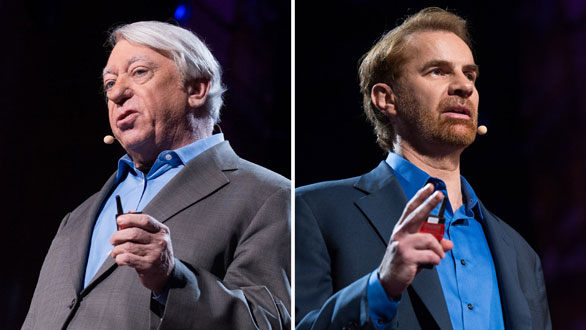
Robert Gordon and Erik Brynolfsson debated their opposing views of where the economy is headed at TED2013. Last week, they brought the debate to a TED Conversation. Photos: James Duncan Davidson
Last week, TED speakers Robert Gordon and Erik Brynjolfsson joined us for a live, one-hour debate on the future of the US economy. It was a furious hour of typing, with both speakers contributing just over 1,500 words in response to a wide variety of user questions. A few highlights:
Ryan Zeigler asks:
Mr. Brynjolfsson, you stated in your talk that you feel that we need to “race with machines” rather than against them. In what manner do you feel that this effects the future of education?
Erik Brynjolfsson responds:
We really need to reinvent education. My industry has lagged other industries in digitizing. Far behind music and other media, finance, manufacturing, retailing, etc. But that’s good news: lots of room to improve. Digitization of education will do two things:
1. Much higher quality and lower cost as very best teachers and methods reach larger audiences. Examples: superstars like Sal Khan of Khan Academy or physics lessons from best MIT profs at EdX.
.
2. More importantly, gather enormous data about what’s working and not working. Apply big data techniques to improve teaching methods and to personalize how things are taught. Adapt pace and methods, based on students unique situation. Continuous learning by the educators, not just students. My students are already doing this to optimize ad clicks – can soon do it for education.
Michael Noyes asks:
Capitalism has created more wealth by far for more people than any other system. However, have we reached a point in our technological history when the pendulum must swing back toward more socialist economics to achieve more prosperity for more people?
Robert J. Gordon responds:
You have to distinguish between “socialism” and the capitalist welfare state as exemplified by Sweden, the Netherlands, etc. Socialism involves government ownership of the means of production and was practiced by the postwar UK Labour government which nationalized steel, transport, etc. It was Thatcher’s achievement to reverse all that, and Britain went from being a laggard to one of Europe’s most dynamic economies.
Yes, we need more of a welfare state, particularly to prepare children in poverty to compete in our educational system. Now they are dropping out of high school and condemning themselves to lives of manual labor and unemployment.
Theresa Sanker asks:
When are America’s economic priorities going to shift toward education, saving, and long-term investment, and away from excessive reliance on military power and cheap energy?
Erik Brynjolfsson responds:
When more people like you demand it. Simple as that.
Robert Gordon adds:
Heckman has shown that the problem is not that we don’t spend enough resources on education. Reducing class sizes has no effect. The problem is that educational resources are not distributed evenly. In an ideal world we would get rid of property taxation as the basis for educational finance, since that gives an advantage to communities with wealthy residents. We should have education funded by a nationwide value-added tax.
The problem with our military, besides the needless wars in Iraq and Afghanistan, is the endless buckets of cash poured into ridiculous projects like the F-35 fighter which has no known enemy to justify its cost. We built the B-17 in WWII for $250,000 per plane!
Finally, what’s wrong with cheap energy? Are you in favor of expensive energy?
With 113 excellent questions and answers, this was a fascinating and informative debate. Don’t miss the rest of the responses, available on TED Conversations »
Comments (3)
Pingback: Flux: The New Rules For Innovation And Growth | Soviders Tech
Pingback: Flux: The New Rules For Innovation And Growth | EN.SamacharYug.com
Pingback: A new playlist from Sir Ken Robinson, the most-watched speaker on TED.com | Framework Marketing Group....blog thoughts by Randal Dobbs